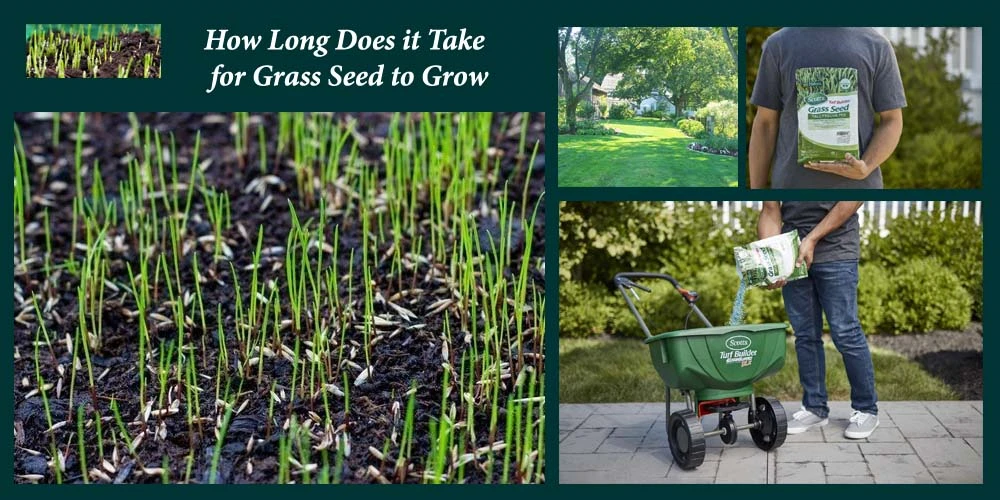reviewed by Christina Lopez
If you are a homeowner lucky to have some space in your homestead, think of how to spruce it up a bit. Better days are opening up, and planting grass can transform the available space into an elegant greenery view. Treating your lawn with grass seeds can help restore some beautiful lushness. This article can help you know how long it takes for grass seed to grow to make the right decision.
More so, if already sown some grass seeds, you will know when something is not correct. Meaning, if germination takes longer than the anticipated time, it rules what to do to get another grass breed. This piece clarifies how long you need to wait before the greenery emerges.
Contents
Planting grass is an excellent investment of time, hope, labor, and money. Proper timing weighs up success from something more minor. Therefore, timing correctly helps seize every chance for seeding success. Although, in most cases, spring is a great season for planting grass, the best time varies with grass seed type and your location.
Grass seeds loving warm weather works ideally in a mild climatic environment. You will need cool-weather grass seeds such as Kentucky or bentgrass if you live in a cool climate. Nevertheless, if you are transitioning between the cold and warm seasons, you may seek professional advice or postpone your planting project.

When your grass seeds planting seasons aligns with their natural active growing period, they grow fastest and most robust. The thriving of grasses is dependent upon their growth cycles and regional preferences. Cold season grasses like perennial ryegrass, Kentucky bluegrass, and tall fescue grow better during late summer cold temperature or early fall. These grasses flourish through the cold climate and transition zone, where calm and warm regions overlap.
Meanwhile, warm grass such as zoysia, Bermuda grass, centipede grass, etc., peaks in the warmer early summer and late spring. Ideal timing your grass seeds in line with their natural peak periods accelerates their germination and establishments.
Generally, in ideal situations, grass may germinate within ten days. However, for the entire establishment of grass without any patches, it may take up to 8 weeks. After eight weeks, you can use the grass field as much as you wish. How long does it take for grass seed to grow will depend on the following factors?
Globally, we all know that water, sunshine, and temperature are the essential elements that accelerate the grass growth rate. However, improper soil preparation and extreme weather conditions can delay or prevent germination even with all these ingredients. Therefore, weather conditions and soil status during sowing affects germination and fast growth.
Ideal grass seed germination weather should be above 10 degrees consistently. Otherwise, any drop could make the germination take longer. Hence, if the temperature remains consistently above 10 degrees for two weeks, expect the best results. Similarly, the most reliable soil for seed germination should be free of moss and weeds and well-drained. Also, note, the seeds should not be buried too deep or on the surface.
Like different grass seeds germinate at varying temperatures and warmth. Also, their full growth time is never the same. For instance, cool-season grasses such as perennial ryegrass require a minimum of 8 degrees consistent temperature to germinate. Hence, the fastest-growing grass seeds with easy to achieve weather conditions. If you compare fescues and perennial ryegrass, the latter grows faster as they can achieve their optimal growing conditions at a slight drop.
The grass mixture is a blend of multiple grass species, and in some cases, seeds are cross-weather conditions. However, professional mixes filter the combination into 100% excellent weather grass seeds or 100% warm weather species. Therefore, cool weather grass grows faster, and as a wise gardener, it’s rewarding to give proper time for germination.
Ornamental lawn enthusiasts always have to wait before making conclusions and probably start weeding before all grass seeds shoot. The patient is a crucial virtue as much as grass planting success is concerned.
After all the above factors are held constant and ideal germination conditions are achieved, your following step matters. After sowing your grass in the right type and season, daily watering, especially during the first weeks, guarantees quicker growth. However, you should not water your grass while it is raining, or it will grow unhealthy. Successful lawn owners do proper research on post-sowing, and pre-sowing water needs to avoid confusion or stunted growth.
According to the experts’ suggestions, grass seeds usually germinate faster in early autumn and mid-spring. This is concerning the regions experiencing the regular four seasons. The thumb rule to speeding up germination requires your care before lawn preparation. Something else necessary is personal patient and preparing at the right time.
In short, before sowing, remove any weeds and dig the space to a depth of at least 20cm. Turn the organic matter deep-rooted in the soil and prick out any weeds appearing during grass germination. Moreover, labeling the area by treading severally accelerates germination and allows proper fertilizer spreading.
Finally, it is essential to know that even after planting your grass seeds at the right time, you still need the care to thrive after germination. Since you know how long it takes for grass seed to grow, seek professional advice if germination takes longer.
If you follow carefully best practices and inclusive of the advice above, you will surely achieve success. Keep your new grass and soil healthy to support smooth growth. Further, consulting the company behind producing the grass seeds you intend to plant can give you light or education resources to ease the project. Although the seeds come with sowing and aftercare instruction in most cases, it is recommendable to call for clarity.
 |
 |
 |
 |

About Christina Lopez
Christina Lopez grew up in the scenic city of Mountain View, California. For eighteen ascetic years, she refrained from eating meat until she discovered the exquisite delicacy of chicken thighs. Christina is a city finalist competitive pingpong player, an ocean diver, and an ex-pat in England and Japan. Currently, she is a computer science doctoral student. Christina writes late at night; most of her daytime is spent enchanting her magical herb garden.
 |
 |
 |
 |
Get new FREE Gifts. Or latest free growing e-books from our latest works.
Disable Ad block to reveal all the links. Once done, hit a button below
 |
 |
 |
 |